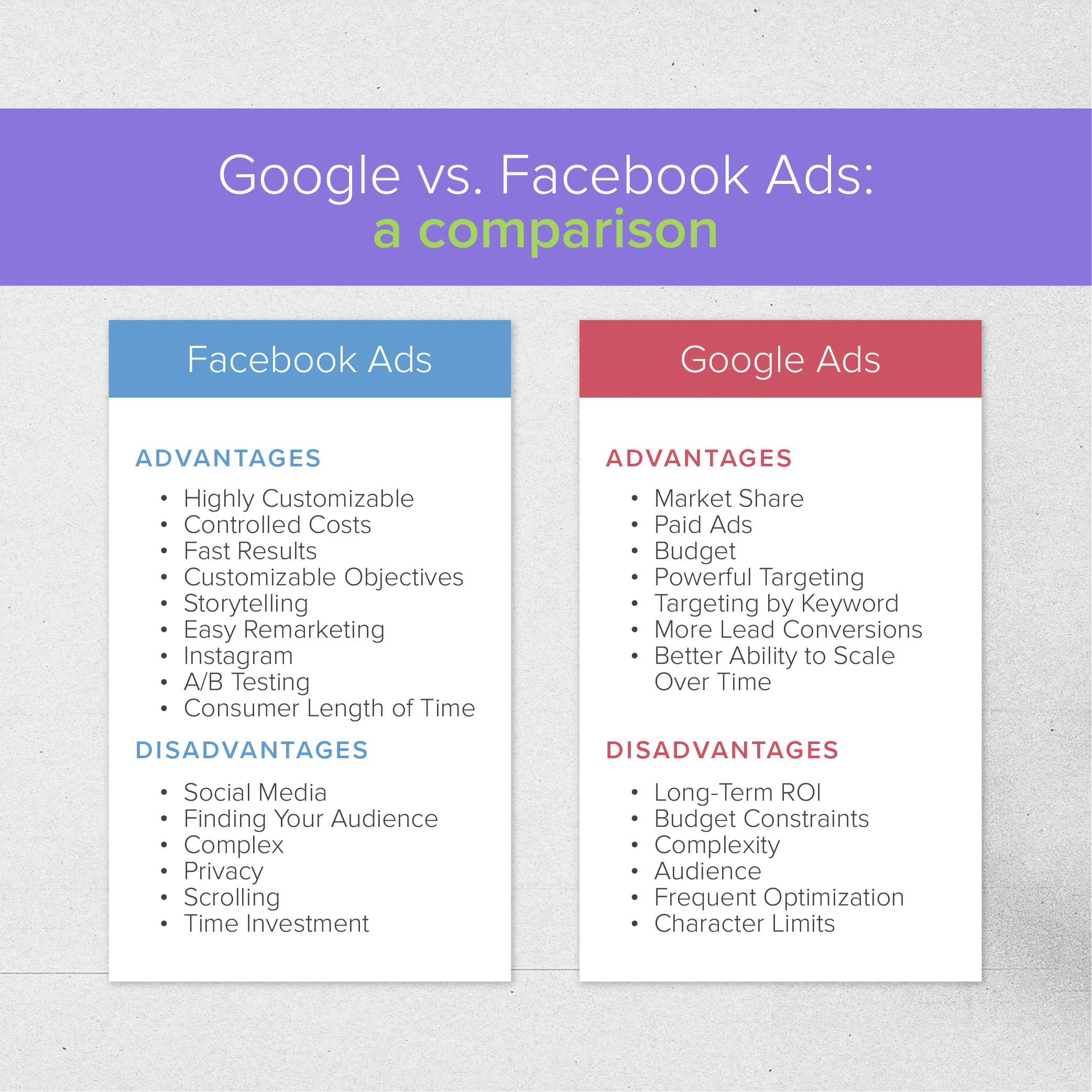Paid ads are a fantastic way to market your child care business, but how do you choose a platform? In this article, we’ll examine two of the biggest paid ad platforms, Facebook Ads and Google Ads, and help you decide which is right for your business.
Ready to Start Using Paid Ads?
If you’re like most of the child care center owners we work with, you’re new to the industry. Maybe you’ve recently purchased your franchise. Regardless, you know who you need to target — parents looking to register their young children — but you may not know exactly where your target audience is online.
You’ve likely already been on Facebook on a personal level and have built an individual network there over the years. However, you shouldn’t assume your entire audience is there, too. Or maybe you have a friend who has run ads on Facebook that have yielded great results. Keep in mind, too, that not all results are created equal, and your friend’s audience has different demographics than yours.
Ad spending all comes down to where your audience is. One platform could seem “better” due to budget and ease of use, but if your audience isn’t there, you’re just throwing money away.
Facebook Ads vs. Google Ads: One or Both?
Your primary consideration when starting a paid ad campaign is your budget. Paid ads aren’t cheap, and they require a healthy amount of marketing spend.
If you have the budget to run both Facebook ads and Google ads, do both. One will always influence and inform the other. But if you have a tighter marketing budget, you’ll need to pick one or the other.
To start, identify which platform your audience uses more frequently and begin there. But what if your audience is equally split between Facebook and Google? Which do you choose?
Facebook ads and Google ads each have their pros and cons. Let’s break them down.
Facebook Ads
Facebook ads are best for driving interest and building community. If you want to encourage your customers to talk to each other, and if you’d like to get reviews and engagement on social media, Facebook ads are a great option.
Advantages of Facebook Ads
- Highly customizable. On Facebook, you can micro-target audiences based on interests, demographics, location, etc.
- Controlled costs. Facebook ads can operate on either high or low budgets.
- Get fast results. If you’re faced with a small window — you need X number of registrations by X date — Facebook is your platform (if your ads are set up properly).
- Customizable objectives. You can set individual goals for your Facebook ads: post engagement, website clicks, page likes, orders, etc.
- Storytelling. Facebook ads allow you to tell your business’s unique story using videos, pictures, carousels, slideshows, etc., to draw users in visually.
- Easy remarketing. Because Facebook’s targeting is so robust, your retargeting will also be robust.
- Instagram. Facebook ads can appear on Instagram as well, yielding twice the exposure for the same cost.
- A/B testing. You can A/B test your ads on Facebook, although this can lead to wasted ad spend if you don’t have a marketing partner to help.
- Length of time. People spend more time on Facebook than they do on Google, so there’s a better chance consumers will see your ads.
Disadvantages of Facebook Ads
- Social media. Facebook is a social media platform, not a business platform, so users often overlook ads. Your ad must be exciting and powerful enough to sway people from their original purpose in visiting Facebook. Also, social media frequenters tend to gravitate to the newest, trendiest platform — at the moment, it’s TikTok — so you end up competing for their attention.
- Finding your audience. If you don’t know exactly where your target audience is, it’s hard to advertise to them, which leads to wasted ad spend.
- Complex. Facebook ads, especially with the new Meta platform, can be difficult to navigate for new users.
- Privacy. As privacy becomes more of a legal issue in the U.S., you can lose some of your Facebook data, so it’s harder to attribute specific actions to a specific user.
- Scrolling. For your ad to reach a user — for them to know you exist — they first need to be scrolling within their own feed. If they don’t scroll far, they may not see an ad.
- Time investment. Facebook ads fatigue over time, so they need constant refreshing to capture attention. That means each new ad must stand on its own merit and rank accordingly.
Google Ads
Google ads meet people during their online searches, so they’re ideal for child care centers looking to increase enrollment.
Advantages of Google Ads
- Market share. Google has the highest market share of all search platforms by far — over 83%!
- Paid ads ranking. On Google, paid ads appear above organic listings, so users see them earlier.
- Budget. Like Facebook, Google makes it easy to set your own budget and control your costs.
- Powerful targeting. On Google, you can target your ads by interest, search history, user intent, website address, demographics, location, and keyword.
- Targeting by keyword allows you to target consumers based on their strong intent to commit to what you’re offering.
- More lead conversions. Meeting people in their search (with intent) leads to the best rate of investment of all digital ad platforms.
- Better ability to scale over time. Once you reach optimal ranking, Google’s algorithm will work in your favor, driving more relevant traffic to you with less wasted ad spend. Google ads also don’t require image and copy updates as frequently as Facebook ads.
- Powerful remarketing. It’s very easy to remarket to consumers who have already interacted with you.
- Artificial intelligence. Google boasts the best artificial intelligence in the world to help you reach the highest quality of traffic.
Disadvantages of Google Ads
- Long-term ROI. Google is a long-term financial investment. New accounts usually take 30-60 days to see results.
- Budget constraints. When it comes to Google, you’ll need a healthy budget that can compete with competitors running ads with the same purpose, bearing in mind that “healthy” doesn’t always mean “high.” At Rose Marketing Solutions, we’re proud of our ability to take “small” healthy budgets and make magic.
- Complexity. Google Ads is a complex platform with a steep learning curve that changes every year. It’s tricky to learn, and it takes a while to master.
- Audience. If you don’t know your audience well, you’ll waste money. Audience requires in-depth research — something RMS does so owners don’t have to.
- Frequent optimization. To not only improve but maintain your performance, you need to optimize your Google ads continually. RMS optimizes so many things for our clients each week, it would be difficult to list them all!
- Character limits. Google has character limits for ad copy, which can make it tricky to get your message across.
- Testing ads on Google can get expensive fast, especially if you aren’t familiar with your audience and market.

Still Undecided About Facebook Ads vs. Google Ads?
Ultimately, Facebook is a social platform, which means sales will be passive. Facebook ads are best for advertising products or services your target audience is likely to be interested in but isn’t actively searching for, like school supplies. Facebook ads must be designed to pull the user’s attention away from their original intent in visiting Facebook.
Google, meanwhile, is a direct platform. Google ads are designed for intentional sales and need to be well targeted. It’s best suited for brands, products, and services people are actively searching for — for example, “kindergarten for 5-year-old.”
Want our recommendation? If you want to grow your online community, Facebook is your option. If you want your ad to be where people are actively searching for a place to register their children, use Google.
Whether you choose Facebook ads or Google ads, having a marketing partner you trust to help maximize your return on investment can make all the difference. At Rose Marketing Solutions, we help clients like you every week, and we’d love to help you, too.
For more information, contact us.
Subscribe
Sign up with your email address to receive news and updates.

